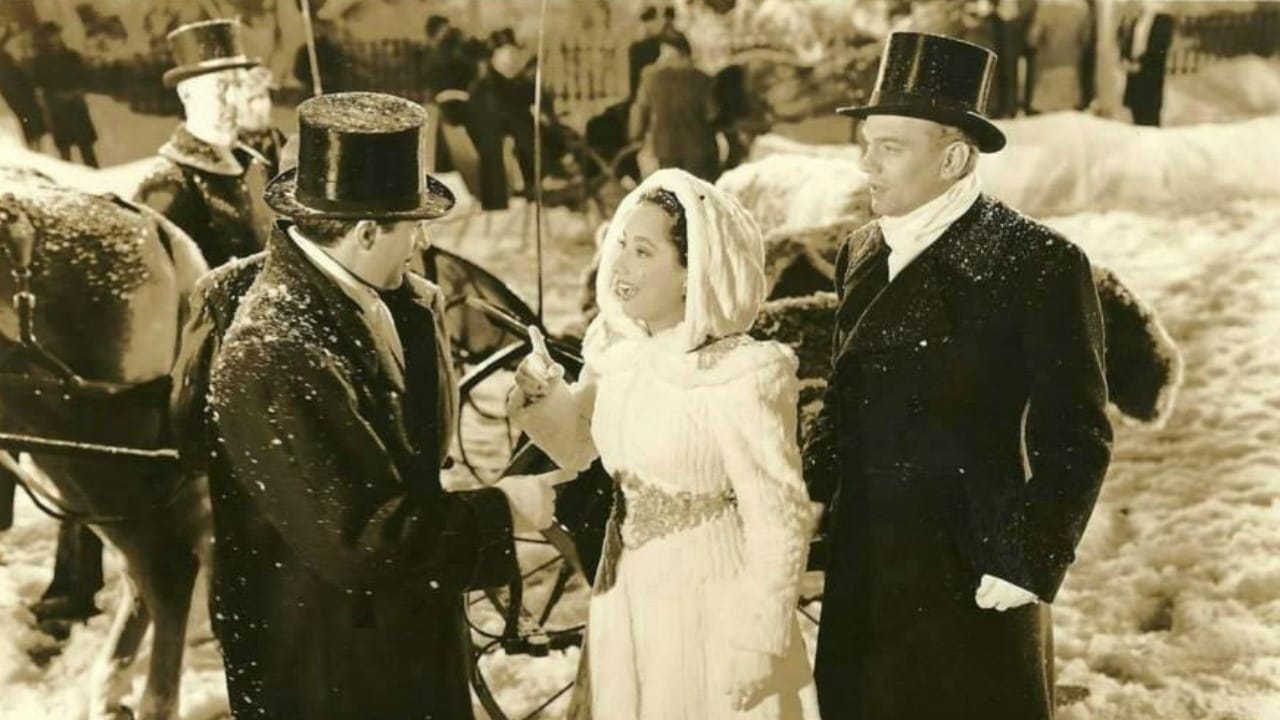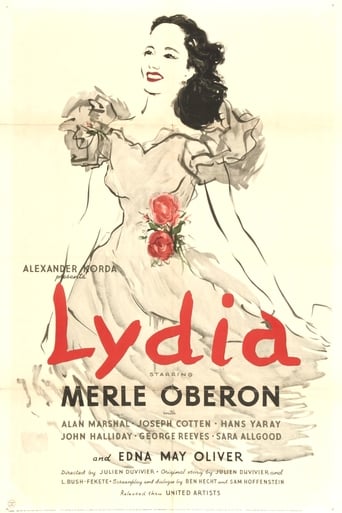

After dedicating a home for blind and crippled children, doddering old Merle Oberon (as Lydia MacMillan), who never married, attends a surprise gathering of her old boyfriends. The reunion is arranged by physician Joseph Cotten (as Michael Fitzpatrick). The son of Ms. Oberon's family butler, Mr. Cotten has also invited blind musician Hans Jaray (as Frank Andre) and future "Superman" George Reeves (as Bill Willard). A fourth beau, seafaring adventurer Alan Marshal (as Richard Mason) may or may not appear. He is one of the story's mysteries, so stay tuned. Oberon and her old suitors reminisce about their romances, in flashbacks beginning in 1897, when "the prettiest girl in Boston" was a desirable young maiden..."Lydia" is a re-make of director Julien Duvivier's "Un carnet de bal" (1937), re-fashioned entirely for star Merle Oberon by producer Alexander Korda. The original French export was a worldwide hit, with Mr. Duvivier and his remarkable original players receiving much critical acclaim. There are some significant changes in the story, but they do improve the central played by Mrs. Korda (Oberon). She is the reason for the picture, clearly. An impressive group was hired for this motion picture; their skills are intermittently evident, but the totality of the film is far too pretentious...Watch "Lydia" for the production values and moments of perfection. You'll find much of the latter in the work of supporting actress Edna May Oliver (as Sarah "Granny" MacMillan). This was the last appearance of Ms. Oliver, a classic character actress who became the most valuable player nearly every time she appeared on screen. Oliver's character appears in the flashbacks, as Oberon's wealthy and outspoken grandmother. She complains about mysterious internal ailments, but is considered a hypochondriac. The veteran actress died in 1942, of internal ailments. In real life, Oliver passed away peacefully in her sleep. On screen, she plays her expiration scene with Shakespearian majesty. This is how it should be done.****** Lydia (9/18/41) Julien Duvivier ~ Merle Oberon, Joseph Cotten, Edna May Oliver, Alan Marshal
... View MoreRight off the bat, I need to tell you that the makeup used to make Merle Oberon, Joseph Cotton, and George Reeves old as they narrate this tale, is atrocious. On the other hand, the brief ballroom scene early on in the film is exquisitely beautiful. The portion of the story regarding Lydia's work with blind children is quite charming. A brief sleigh race is quite well done. And yet, despite these sporadic highlights, this film doesn't quite come together. I kept thinking that more competent screen writing could have done wonders with putting the chapters of the story together in a more coherent manner.Joseph Cotton was a fine, underrated actor, and he is wonderfully pleasant in this film. Merle Oberon was -- in some films -- remarkably beautiful. I say that in that way because in this film you will see her beauty in some scenes, but in other scenes -- providing you are aware of her biography -- you will see her face and truly wonder what her true heritage was.This film benefits greatly from the presence of a wonderful female character actor -- Edna May Oliver. What a gem! And for once she got the billing she deserved...second in this film only to Merle Oberon. And, in this film you get to see George Reeves (later to play television's Superman) in a more substantial role than he had in most other films.Despite my criticisms of this film, I never once was tempted to turn it off. It was ALMOST a great film.
... View MoreWhen the film was finally released in Duvivier's native France ,it did not meet critical favor.I personally find little fault with the opinions expressed."Lydia" is a confused cold work.Duvivier's great American movies are not "Great Waltz" or "Lydia" .They were yet to come:"tales of Manhattan" and "Flesh and fantasy" are immensely superior to the aforementioned efforts."Lydia" is supposed to be a remake of "Un Carnet de Bal ",Duvivier's indisputable masterpiece.But the two works are worlds apart.I would go as far as to write "Lydia" is to "Carnet de Bal" what "The long night" is to "Le jour se lève" .But Carné's chef d'oeuvre was remade by Anatole Litvak whereas Duvivier redid himself.Actually "Lydia" reminds me of Duvivier failed film "Untel Père Et Fils " ;it's a hodgepodge : a grumpy granny with a golden heart, a sailor ,the Civil War(?) , a blind pianist ,the sad fate of blind children during the nineteenth century, the good lady whose life is not empty cause she creates a house for these unfortunate kids (a permanent feature of the French cinema of the era : see also "Le Voile Bleu"-remade as "the blue veil" - and "Péchés de Jeunesse").Nothing is left from the original work,the Madeleine of Proust of the French cinema: and showing Merle Oberon with her three beaus (and the fourth is not far away)does not make up for Marie Bell's spleen,solitude and nostalgia on the banks of the lake.One should also add that the male characters are not really interesting.Orson Welles was a great Duvivier fan and it's probably the reason why Joseph Cotten is part of the cast.Later,Welles would borrow the female star of "Au Royaume des Cieux" (Suzanne Cloutier) from Duvivier for his "Othello".The best of this movie is its pictures:the ball is nicely filmed ,although a bit kitsch;the snowy landscapes are enhanced by a refined cinematography.The sound of my copy is rather lousy. The music ,which is intrusive,often drowns out the actors' voices.
... View MoreIf you can feel the pain and longing of others (and who can't?), this picture will break your heart. Yes, it is slow, even plodding at times, but the ending overrides all of that.Being totally, hopelessly (or is it hopefully?) in love, she rejects the stability offered by a loyal, devoted suitor and friend for the memory of the one man who made her blood boil. Although he did not return to her, as promised, she thinks of him constantly and dares to cherish the hope that one day he may, after all, return to her.She is an old woman when in fact he does reappear by chance in her life. Pathetically, this is to somehow justify the wasted years. She is trembling with anticipation, ready to learn why he was unable to return to her, his lover, eager to forgive even though it has cost her youth and happiness.Need I go on? He doesn't even remember who she is. He was the one man in her life; she learns much too late that she was obviously one of a great many women in his.More than a "women's picture" or conventional tearjerker, this one deserves your attention. Just be patient.
... View More